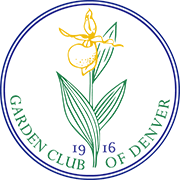The sweet sound of buzzing bees is one not to be taken for granted. Without bees, we have no food. And it is not lost on many of you in the Garden Club of Denver just how important these pollinators are.
A few facts about our busy friends:
- Millions of bees are dying off, which is bad news for our food supply.
- Bees pollinate 71 of the 100 crops that provide 90% of the world’s food supply.
- Nearly 85% of the earth’s flowering plants depend on bees to reproduce.
- Bees, as we know, are a keystone species to our ecosystem as a whole. They pollinate wild plants that result in fruit and seeds that feed our bird and mammal populations.
- Despite all the continued recognition of bees’ importance, bees and other pollinators are in decline.
There are many reasons for the bees’ decrease in numbers. There are about half the managed hives as we had in 1950. Winter losses continue to challenge beekeepers; pesticides, diseases, climate change and loss of floral diversity to name a few. The cropland requiring the support of the bee population has doubled since 1960.
Many suggest that turning to native bees instead of the European honeybee could be one answer. There are approximately 4,000 species of native bees working as pollinators. New research highlights that on a per bee basis, native bees are more effective than their European counterparts at pollinating crops like pumpkins, cherries, apples, squash, cranberries and sunflowers.
What can we gardeners do? Most of you already know, but as a gentle reminder, both native bees and European honeybees depend on a diversity of flowering plants. As you plan a garden over the fall and winter months, plan to plant a range of flowering plants that provide a succession of blooms, which will give the bees nectar and pollen from spring until late fall. A diverse diet of blooms and wildflowers will support a bees immune system. So think about Aster, Goldenrod, Penstemon and Milkweed; the bees (and butterflies) will thank you!
Another thing we can do to help is sign up to volunteer on October 26 and 27 to plant along the I-76 Pollinator Highway Project. This exciting project needs 40 volunteers to help plant from 9 a.m. – 4 p.m. each day. To volunteer please email Joyce Kennedy ( joyce@peopleandpollinators.org) or Mary Ann Colley ( mcolley@butterflies.org) . The Conservation Commmitee will also have a sign up sheet at our October meeting for those interested.
